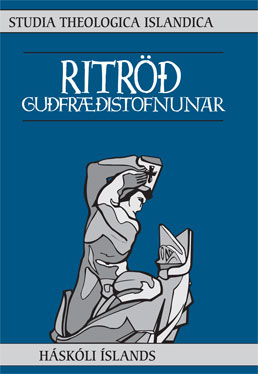Ægifögur reiði
Um guðfræði og fagurfræði eldgosa
Lykilorð:
Eldfjöll, afhelgun, upplýsing, rómantík, nítjándu aldar ljóðlist, Volcanoes, disenchantment, enlightenment, romanticism, 19th century poetryÚtdráttur
Útdráttur
Það virðist vera nokkuð algeng skoðun að viðhorf Íslendinga til eldgosa í aldanna rás hafi að mestu leyti einkennst af raunhyggju og pragmatisma en í minna mæli af goðsögum og yfirnáttúrulegum skýringum. Þessa skoðun má setja í samhengi við upplýsinguna sem meðal annars hafði það að markmiði að berjast gegn bábiljum alþýðunnar. Ákveðin þversögn felst í því að upplýsingin hefði líklega verið óþörf ef goðsögur og yfirnáttúrulegar skýringar hefðu verið víkjandi viðhorf. Í þessari grein verða þessi viðhorf sem hafa verið talin víkjandi könnuð nánar. Bornar eru saman tvær tegundir texta um eldgos, annars vegar ritgerðir
kristinna höfunda frá 17. og 18. öld og hins vegar ljóð nokkurra 19. aldar skálda um eldgos. Frægasta dæmið um hina kristnu eldgosaumræðu er að finna í eldriti Jóns Steingrímssonar en slíkar túlkanir má finna víðar. Gerð er grein fyrir þessum kristnu túlkunum á eldgosum og síðan eru færð rök fyrir því að í ljóðum 19. aldar skálda um eldgos megi greina enduróm af kristnum og heiðnum trúarhugmyndum. Í þessu samhengi mætti ýmist tala um afhelgun trúarlegra hugmynda eða að í ljóðum rómantísku skáldanna sé að finna viðleitni til að endurhelga náttúruna.
Abstract
It is a common notion that Icelanders’ perception of volcanic eruptions has over the centuries first and foremost been characterized by realism and pragmatism, but to a lesser extent by myths and supernatural explanations. This notion can be seen in the context of the Enlightenment which, among other things, aimed at fighting superstition among the population. Paradoxically, the Enlightenment would most likely have been unnecessary if myths and supernatural explanations had been subordinate perspectives. In this article, the perspectives, which until now have been considered subordinate, will be carefully examined. Two types of texts about volcanic eruptions are compared, on the one hand, essays by Christian authors from the 17th and 18th centuries and, on the other hand, poems about volcanic eruptions written by 19th century poets. The most famous examples of Christian ideas about volcanoes are in Jón Steingrímsson’s writings on the Laki eruption, while such interpretations can also be found elsewhere. These Christian interpretations of eruptions are described, and it is argued that 19th-century poems about eruptions contain echoes of Christian as well as pagan religious ideas. In this context, one could either speak of the
secularization of religious ideas or that poetry of the 19th century poets represents efforts to re-enchant nature.


